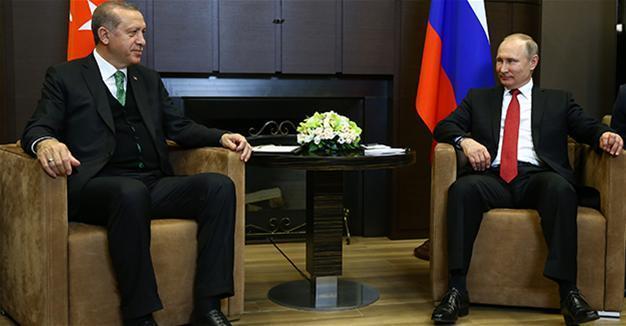Turkey, Russia steps ‘may influence Middle East’
SOCHI
 Joint steps by Turkey and Russia could influence the situation in the Middle East, Turkish President Recep Tayyip Erdoğan said on May 3 as he met Russian President Vladimir Putin to discuss the situation in Syria and other economic and political issues.
Joint steps by Turkey and Russia could influence the situation in the Middle East, Turkish President Recep Tayyip Erdoğan said on May 3 as he met Russian President Vladimir Putin to discuss the situation in Syria and other economic and political issues.“Today we have a very good chance to discuss both our relations in the bilateral format and consider regional issues,” Erdoğan said in Sochi.
“We have very serious work on our shoulders and a very big responsibility. And I am sure that the steps we take together will change the destiny of the whole region,” Erdoğan said.
Russian-Turkish relations have attained a special status and are being fully restored, Putin said.
“It is very good that we have an opportunity to have an official meeting, discuss the key issues of bilateral interaction and the main issues on the international agenda, including such urgent ones as the Syrian crisis,” he said.
“The very fact that there is such a mode of joint work shows that Russian-Turkish relations are attaining a special character, a special status, and are being fully restored,” he added.
Putin also congratulated Erdoğan on the results of the April 16 referendum on constitutional amendments, which expanded the powers of the president.
The top item on the agenda of the meeting was the situation in Syria, with both sides aiming to consolidate the cease-fire in the country.
In March, officials from Turkey and Russia held a meeting in Ankara in order to discuss the upcoming phases of the Astana process, particularly deploying truce observers to the field as mentioned in a Dec. 30, 2016, truce deal. The issue is expected to be on the agenda of the talks.
Russia has suggested that Turkey deploy Turkish cease-fire monitoring forces in Syria after Moscow established the same mission in the northern Afrin region, sources told the Hürriyet Daily News. Russia raised the proposal of a truce monitoring mission by Turkish security officials in the field after Moscow deployed troops near Menagh airport in the Afrin region in March, in collaboration with the People’s Protection Units (YPG).
Turkey has repeatedly asked the U.S. and Russia to cut their ties with the Syrian Kurdish YPG, which is fighting against the Islamic State of Iraq and the Levant (ISIL). Turkey says the YPG is an offshoot of the outlawed Kurdistan Workers’ Party (PKK) and considers it a terrorist group.
Before meeting Erdoğan, Putin held a telephone discussion with U.S. President Donald Trump on May 2, signaling improving prospects for cooperation in Syria.
The Kremlin said Trump and Putin agreed to bolster diplomatic efforts to resolve the Syrian civil war, which has left hundreds of thousands dead and millions more displaced. The White House announced it would send a top State Department official to Russian-led talks on Syria that were to begin yesterday in Kazakhstan.
“President Trump and President Putin agreed that the suffering in Syria has gone on for far too long and that all parties must do all they can to end the violence,” the White House said. “The conversation was a very good one, and included the discussion of safe, or de-escalation, zones to achieve lasting peace for humanitarian and many other reasons.”
Another important agenda item of the meeting between Erdoğan and Putin was the removal of the embargoes that Moscow implemented after Turkey shot down a Russian plane in 2015. Mutual steps were taken in the process of normalization, but Russia has not removed obstacles in front of many agricultural products exported from Turkey. Ankara, in response, removed Russia from the list of countries that could export wheat, corn and sunflower oil to Turkey free of charge.
Speaking in Ankara before leaving for Sochi, Erdoğan said he wanted Russian trade restrictions on Turkey to be lifted rapidly.
















